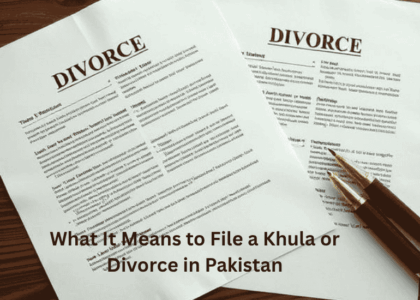In Pakistan, family is the cornerstone of society, and ensuring the financial well-being of a wife and children is not just a moral duty but a legal obligation. Maintenance laws protect vulnerable family members, ensuring they live with dignity. Whether you’re a wife seeking support during marriage or a parent navigating child maintenance in Pakistan, understanding your rights is crucial. As someone who has seen family disputes unfold in Islamabad’s courts, I can attest to the importance of clear, accessible information. This guide breaks down the essentials of maintenance under Pakistani law, offering practical insights to empower you.
Understanding Maintenance Rights in Pakistan
Maintenance, or financial support, is a legal right for wives and children under Pakistani law. It ensures that dependents are not left struggling due to separation, divorce, or financial neglect. The laws are rooted in Islamic principles and codified in statutes like the Pakistan Family Law Ordinance 1961. Navigating these laws can feel overwhelming, but knowing your rights can make all the difference. This article explains who qualifies for maintenance, how it’s calculated, and how to enforce it, with a focus on family court maintenance case in Islamabad.
Legal Definition of Maintenance under Pakistani Law
In Pakistan, maintenance refers to the financial support a husband or father is obligated to provide for his wife and children. It covers essentials like food, clothing, shelter, education, and healthcare. The concept is deeply tied to Islamic law, which emphasizes a man’s duty to provide for his family. Under the Muslim Family Laws Ordinance, 1961, maintenance is a fundamental right, enforceable through family courts. Courts ensure that the support reflects the family’s needs and the provider’s financial capacity.
Who is Entitled to Maintenance?
Not everyone qualifies for maintenance, but the law prioritizes those most in need. The following groups are entitled:
- Wives: A legally married wife is entitled to maintenance during marriage and, in some cases, after divorce.
- Children: Minor children, typically under 18, are entitled to support from their father, regardless of custody arrangements.
- Divorced Women: A wife may claim maintenance during the iddat period (three months post-divorce) or longer under certain conditions.
Eligibility depends on factors like marital status, financial dependency, and the provider’s ability to pay.
Maintenance of Wife
Wife Maintenance Law Pakistan
Under the Muslim Family Laws Ordinance, 1961, a wife has a clear right for wife maintenance Pakistan law during marriage. This includes food, housing, clothing, and other necessities. If a husband fails to provide, the wife can approach a family court to enforce her rights. I’ve seen cases where women, unaware of their entitlements, struggled unnecessarily. For example, a friend in Islamabad successfully filed for maintenance after her husband stopped supporting her, securing a stable income for herself and her children.
Maintenance Rights in Case of Separation or Divorce
- During Marriage: A wife can claim maintenance if her husband neglects his financial duties, even if they live together.
- Post-Divorce (Iddat Period): After divorce, a wife is entitled to maintenance during the iddat period, typically three months, as per Islamic law. Courts may extend this in exceptional cases, such as pregnancy.
The amount depends on the husband’s income and the wife’s needs, ensuring she’s not left destitute.
Maintenance of Children
Child Maintenance Law Pakistan
Children are the heart of any family, and their well-being is a priority under Pakistani law. The father is primarily responsible for child maintenance in Pakistan law, covering expenses like schooling, healthcare, and basic needs. Even if the mother has custody, the father must contribute financially. In one case I followed, a father in Islamabad was ordered to pay for his daughter’s education, ensuring she could continue her studies despite her parents’ divorce.
Children’s Maintenance After Divorce
- Custody vs. Maintenance: Custody determines who cares for the child, but maintenance is the father’s duty, regardless of who has custody.
- Schooling, Healthcare, and Basic Needs: Maintenance includes tuition fees, medical expenses, and daily necessities. Courts ensure these are adequately covered.
The amount varies based on the child’s age, needs, and the father’s financial situation.
Islamic Perspective on Maintenance Obligations
Islamic law forms the backbone of maintenance laws in Pakistan. The Quran emphasizes a husband’s duty to provide for his wife and children, reflecting fairness and compassion. For instance, Surah Al-Baqarah (2:233) highlights the importance of supporting a divorced wife and her child. This religious foundation ensures that maintenance is seen as both a legal and moral obligation, resonating deeply with Pakistan’s cultural values.
Relevant Laws Governing Maintenance in Pakistan
Muslim Family Laws Ordinance, 1961
This ordinance is the cornerstone of wife maintenance law in Pakistan. Section 9 specifically mandates that husbands provide maintenance to their wives and children. It empowers courts to enforce these obligations, making it a critical tool for families seeking justice.
Family Courts Act, 1964
The Family Courts Act establishes family courts to handle disputes, including maintenance cases. These courts are designed to be accessible, with simplified procedures to ensure swift justice. In Islamabad, family courts play a vital role in resolving maintenance disputes efficiently.
Other Applicable Legal Provisions
Additional laws, such as the Guardians and Wards Act, 1890, and provincial regulations, support maintenance claims, particularly for children. These laws ensure a comprehensive legal framework for protecting dependents.
How Maintenance is Determined by Pakistani Courts
Factors Affecting the Amount
Courts consider several factors when determining maintenance:
- Husband’s Income: The provider’s financial capacity is key. A wealthy husband may pay more than one with modest means.
- Dependents’ Needs: The wife and children’s expenses, including housing and education, are evaluated.
- Number of Dependents: More children may increase the maintenance amount.
Role of Standard of Living and Husband’s Income
The family’s previous standard of living is a major factor. If a wife and children enjoyed a comfortable lifestyle, courts aim to maintain that standard. For example, a high-earning husband may be ordered to pay for private schooling or a spacious home to reflect the family’s prior circumstances.
Enforcement of Maintenance Orders in Islamabad
Child Maintenance in Islamabad
In Islamabad, family courts enforce maintenance orders rigorously. If a husband or father fails to comply, the court can garnish wages or seize assets. I recall a case where a father’s non-compliance led to his bank account being frozen, ensuring his children received their due support.
How to File a Maintenance Case
Filing a maintenance case is straightforward:
- Consult a Lawyer: A family law expert can guide you through the process.
- File a Petition: Submit a maintenance petition in the family court, detailing your needs and the provider’s income.
- Attend Hearings: Present evidence, such as income records or expense receipts, during court hearings.
- Receive an Order: If successful, the court will issue a maintenance order, enforceable by law.
Role of Family Courts in Islamabad
Family courts in Islamabad are designed to handle maintenance cases efficiently. They prioritize quick resolutions, minimizing stress for families. Judges are trained to balance fairness and compassion, ensuring justice is served.
Legal Aid and Support Services
For those who can’t afford legal fees, organizations like the Islamabad Legal Aid Office provide free or low-cost services. Women’s shelters and NGOs also offer support, helping mothers navigate the legal system with confidence.
Conclusion
Understanding maintenance laws in Pakistan empowers wives and children to secure their financial rights. Whether it’s enforcing wife maintenance under the Muslim Family Laws Ordinance, 1961, or ensuring child maintenance in Islamabad, the legal system is designed to protect families. By knowing your rights and accessing family courts, you can ensure a stable future for yourself and your children. If you’re facing challenges, don’t hesitate to seek legal advice or support services—help is available, and you deserve to live with dignity.





